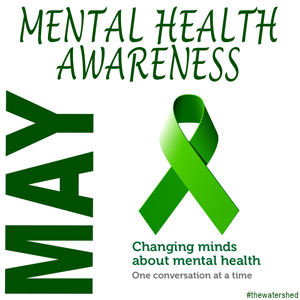Trigger warning: mental health problems, especially depression.
Since May is Mental Health Awareness Month I was inspired to write a two-part blog series on mental health in the workplace (click here to read the first part). In part one, I discussed the “Do’s and Don’ts – How to be Mindful of Mental Health in the Workplace” and why mental health problems need to be recognized by managers and coworkers with the same empathy, support, and discretion that any other illness would be treated.
Sadly, this is not always a reality, and all too often employees walk into their offices or other places of employment feeling anxious, depressed, isolated and afraid to speak up about their mental health struggles for fear that it will make them appear incompetent or worse a liability to their managers. Ignoring mental health issues in the workplace can negatively affect a company’s productivity and bottom line as I already discussed in part one of this series. There can also be other dire consequences. This is a difficult and sometimes triggering topic that is rarely discussed in the open. Unfortunately, on rare occasions, this topic becomes front and centre when an employee ends their own life – or when someone violently takes the life of an employee in the organization. When the worst thing happens, how can leaders and employers deal with this dramatic and tragic type of emergency?
A different kind of first aid
 To be clear, I do not think that HR or those in supervisory roles are expected to be mental health experts. I’d never suggest trying to diagnose or treat an employee or co-worker. With that said, being aware that mental health problems are extremely common is a good start. It is also important that leaders/ management are engaged enough with their employees to recognize major (observable) changes and signs of mental health struggles is a reasonable and proactive way to operate within any work environment (e.g., more frequent absences, changes in quality and/or quantity of work, significant changes in mood/attitude, etc.). The Mental Health Commission of Canada offers Mental Health First Aid Training and Resources. Although this may not be as common in most workplaces as a regular, physical first aid training program, given the prevalence of these issues, it should catch on in organizations and hopefully become mandatory.
To be clear, I do not think that HR or those in supervisory roles are expected to be mental health experts. I’d never suggest trying to diagnose or treat an employee or co-worker. With that said, being aware that mental health problems are extremely common is a good start. It is also important that leaders/ management are engaged enough with their employees to recognize major (observable) changes and signs of mental health struggles is a reasonable and proactive way to operate within any work environment (e.g., more frequent absences, changes in quality and/or quantity of work, significant changes in mood/attitude, etc.). The Mental Health Commission of Canada offers Mental Health First Aid Training and Resources. Although this may not be as common in most workplaces as a regular, physical first aid training program, given the prevalence of these issues, it should catch on in organizations and hopefully become mandatory.
Even having the best systems in place to deal with someone who is at risk does not guarantee that every employee will get the services that they need in time. As noted previously, sometimes people keep these problems to themselves. But with that said, sometimes, an employee’s mental health struggles can sometimes be seen in the workplace since most of us spend much of our time at work.
Anecdotal evidence suggests that some people who are struggling with mental health issues feel that they have been ignored or hurt by their employer … and occasionally when things have gone terribly wrong at work (e.g., bullying/harassment, sexual harassment, being made a scapegoat, or being fired) this can trigger a mental health crisis.
With the end of May/Mental Health Month nearing, I hope that we can all agree that this is an issue that deserves more than 4 weeks of awareness. It warrants everyday sensitivity and acknowledgment in the places where we work. Without paying attention to this under-discussed issue, nothing works as it should. And as someone with a deep foundation in psychology, I believe that this should matter to organizations just as much as profits. Long-term financial viability is linked to the wellness and resilience of an organization’s workforce.
Have you ever wished you could get inside the head of a hiring manager? You can. Dr. Helen Ofosu is a Career Coach/Counsellor with a difference. She has worked for organizations to create hiring and screening tools. She’s created countless pre-screening tests, interviews, simulations, and role plays for organizations of all kinds.
Dr. Helen’s training in Industrial and Organizational (I/O) Psychology means she is a genuine expert in evaluating work-related behaviours. She uses those skills to help hiring managers tell the difference between people who say the right things during interviews and people who actually deliver on the job. In other words, Dr. Helen understands first-hand how job candidates are assessed.
Do you need help navigating the world of work? Contact Dr. Helen today for a free and confidential initial consultation by phone, email, or via direct message on Twitter/X, Facebook, or LinkedIn.
More than career coaching, it’s career psychology®.
I/O Advisory Services – Building Resilient Careers and Organizations.™




